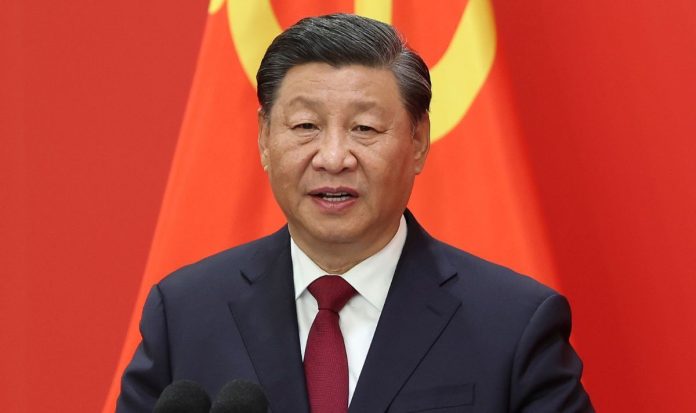China and the United States do not necessarily have to head to a confrontation, President Xi Jinping told visiting American senators on Monday.
It was the strongest sign yet that he might attend the Apec summit in San Francisco next month, raising hopes also for a meeting with US counterpart Joe Biden.
“The Thucydides Trap is not inevitable,” Xi told the bipartisan delegation headed by Senate Majority Leader Chuck Schumer, referring to the concept of confrontation between a rising and a dominant power.
“The wide world can accommodate China and the US in their respective development and common prosperity.”
Beijing has always believed that the common interests of China and the US far outweigh their differences and the success of either country “presents an opportunity, not a challenge” for the other, state news agency Xinhua quoted Xi as saying.
The meeting came amid months of efforts to get bilateral ties back on track amid confrontations in the South China Sea and Taiwan Strait, as well as US-led tech export curbs directed at China.
South Korea, a close US ally, said on Monday that Washington would allow major Korean chip makers Samsung Electronics and SK Hynix to import the advanced US machinery they needed to sustain and expand their operations in China, a move that could be seen as a concession by the Biden administration.
Schumer said the US team spoke candidly with Xi about a range of issues and “respective priorities” during their 80-minute meeting. They also held talks with Foreign Minister Wang Yi, Commerce Minister Wang Wentao and other senior Chinese officials.
“We made clear to President Xi that America wants fairness and stability. At the foundation of the relationship must be a level playing field for American businesses and workers, as well as responsible competition,” the Democrat told a press briefing after the meetings.
The senators also called on Beijing to remove restrictions and open up Chinese markets to US companies, including the semiconductor, financial services and aerospace industries. They also urged Xi to open a channel of communication to stem the flow of fentanyl precursor chemicals as the US battles an opioid epidemic.
“We had a long list of issues we feel China had to address and we were very, very clear and specific on all of those,” Schumer said.
Schumer also criticised China for not supporting Israel after the Hamas attack on Saturday.
“I urge you and the Chinese people to stand with the Israeli people and condemn these cowardly and vicious attacks,” he told Xi, adding he was “disappointed” at Beijing’s apparent lack of “sympathy or support”.
Schumer expressed similar views to Wang Yi when they met earlier in the day.
The delegation’s trip marks the first US congressional visit to China since 2019. The six-member team arrived in Shanghai at the weekend, seeking “direct, candid and respectful” conversations with the Chinese leadership.
The visit was viewed as helping lay the groundwork for a potential trip by Xi to attend the Apec summit, where an in-person meeting with Biden was expected to take place.
Beijing did not confirm the Xi-Schumer meeting even hours before it took place, but the surprise talks were seen as a positive sign that the Chinese leader would travel to the US.
Lu Xiang, a specialist in US-China relations at the Chinese Academy of Social Sciences (CASS), said the surprise meeting “reversed the communication mechanism between the US Congress and China that had been stagnant for many years”.
“Although Congress has relatively little power in foreign policy, Schumer can personally understand China’s intentions through the visit and convey them to Congress, which is of positive significance,” Lu said.
Alfred Wu, an associate professor at the Lee Kuan Yew School of Public Policy at the National University of Singapore, said Xi and Schumer’s meeting did not guarantee a Xi-Biden meeting but there was a high chance because both sides were working closely towards one.
“The meeting between US and Chinese senior diplomats actually intensified recently, and I believe there are a lot … less senior exchanges [between the two countries] to work out the detailed plan for Xi’s meeting with Biden in the US,” he said.
China’s foreign ministry issued a statement on Sunday, calling for restraint and a ceasefire from all parties, without condemning the attack.
The US group’s trip to China followed visits by a series of senior officials in the Biden administration earlier this year, including Secretary of State Antony Blinken, Treasury Secretary Janet Yellen, Commerce Secretary Gina Raimondo and climate envoy John Kerry.
The bipartisan congressional delegation will head to the northwestern Chinese city of Xian after stops in Shanghai and Beijing. The delegation will then visit South Korea and Japan.
Hours after landing in Shanghai on Saturday, the senators met the city’s Communist Party secretary, Chen Jining.
“We will, as always, create a first-class business environment that is market-oriented, rule of law-oriented and internationalised, and help enterprises to better invest and prosper, and achieve greater development through win-win cooperation,” Chen said.
The senators told Chen the US did not seek decoupling or conflict with China while the purpose of their visit was to enhance understanding between the two sides to help resolve differences and concerns, according to the Chinese readout.
Schumer, as the top Democratic lawmaker, has long urged a harder US line on China.









































